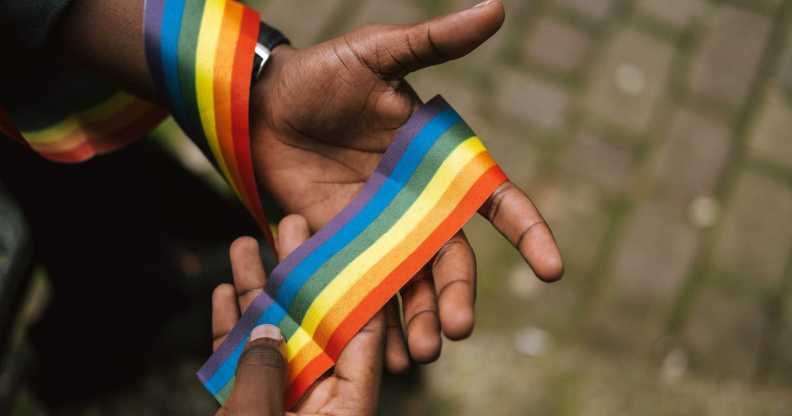Scotland conversion therapy ban would ‘protect LGBTQ+ people from harm’, minster says

Scotland has launched an consultation on conversation therapy legislation (Canva)
Scotland’s equality minister has described the UK as a “really difficult environment” for LGBTQ+ people.
On Tuesday (9 January), the Scottish government launched a public consultation on planned legislation for the devolved nation, which would end conversion therapy: practices that purport to change or suppress a person’s sexual orientation or gender identity.
The consultation presents detailed information on the proposals for the law and sets out what it would cover and how it would work in practice, while protecting existing freedoms related to speech, religion and belief.
Actions such as prescribing medication to suppress a person’s sex drive, controlling a person’s activities and appearance, and threatening or humiliating someone, are among examples that could be covered by the legislation.
The SNP government made clear that providing advice, guidance or support for an individual exploring their identity – such as by a healthcare practitioner – parental questions about a child’s decisions, and general statements of belief or opinion would not constitute conversion practices.
Speaking to PinkNews about the consultation, and the fact that conversion practices have already been banned in other countries, Scotland’s minister for equalities, migration and refugees, Emma Roddick, described the environment for LGBTQ+ people in the UK as really difficult.
“That does create difficulties not just for governments but… for organisations that support the community as well because every time we try to make progress – however small – or improve lives, that gets met with a lot of resistance and often abuse,” she said.
“We can’t back away at that point and just stop doing the right thing. But it does tend to create road blocks, processes can be drawn out, things start to get used as political ammunition rather than sticking to the facts of debates and trying to figure out the best way to implement change.
“It starts to be used in a way that becomes damaging not just to the community and the people we’re talking about, but to trust in politics.”
‘Maybe we can find common ground’
Concern over the ways in which the consultation and legislation will be engaged with by groups who oppose a conversion therapy ban and wider pro-LGBTQ+ legislation, is not unwarranted.
A parliamentary debate on the topic in December by cross-party Westminster MPs descended into a conspiracy-theory laden, scare-mongering farce about “transing away the gay”.
Holyrood’s consultation comes off the back of losing its legal case against the UK government use of a Section 35 order to block the Gender Recognition Reform (Scotland) bill from gaining Royal Assent.
The bill, which underwent years of consultation and review, became an intense and vicious battleground over not just trans, but also women’s and children’s, rights, and the stability of devolution itself.
“I’m certainly worried about the tone that certain corners of society use when they discuss LGBTQ+ issues,” Roddick added.
That being said, “all feedback is useful” to the Scottish government, and the minister is keen to hear from people who support the bill, those who dislike certain aspects and “straight-out critics”.
She went on to say: “I would absolutely love it if everybody was really positive about what we’re trying to do and just thought we’d got it bang-on right away but, realistically, that’s never going to be the case.
“Maybe there are ways we can find common ground and I can bring more people on board with what we’re trying to do, because we’re trying to protect people in Scotland from [the] harm we know is being inflicted on them just because of who they are.”
Roddick noted that although the debate element of the legislation is “absolutely necessary”, the “side effect is that people who have suffered those practices and been traumatised can have that reawakened”.
In response, Holyrood has funded the LGBT Health and Wellbeing Helpline, which offers support to those who have suffered, or are at risk of, conversion practices, and Roddick encouraged people to use the service to access the help they need.
‘I would love to see these practices banned across the world’
Although passing new legislation is never straightforward and it is difficult to predict the exact timeline, the Scottish government says it aims to pass the bill during the current parliamentary term.
Meanwhile, in Westminster, it’s been more than five years – and three new prime ministers – since PM Theresa May vowed to outlaw it.
The continued delay has led to thousands of people signing online petitions, and backbench MPs introducing a private members’ bill in an attempt to hurry the process on.
“I would love to see these practices banned across the world and it will be very sad to me if on that happy day we ban conversion practices in Scotland, they’re still occurring in neighbouring countries. That is difficult to swallow,” Roddick said.
“I’m willing to work with any UK government on the shared goal to support LGBTQ+ people in our country.”
Scotland’s consultation runs until 2 April. Support is available through the conversion practices helpline.
How did this story make you feel?

